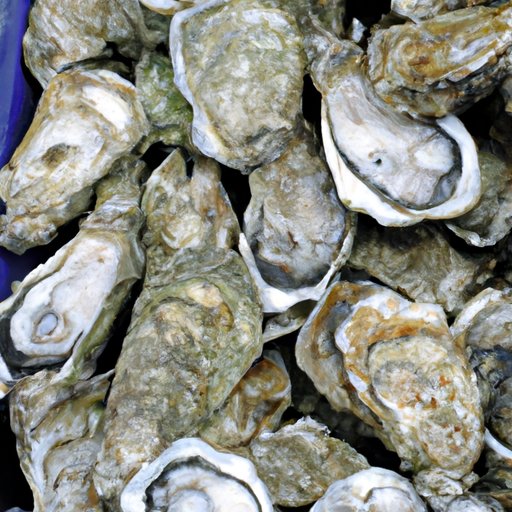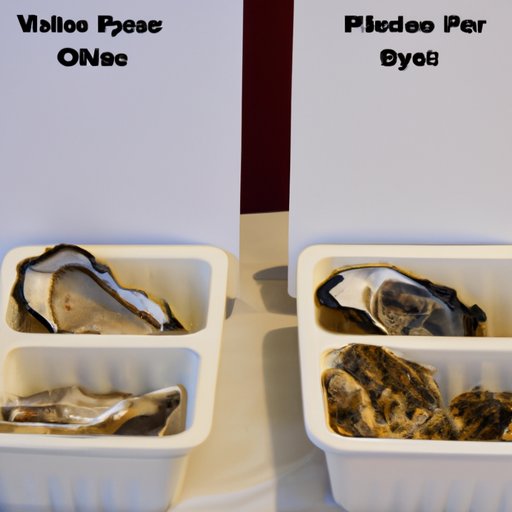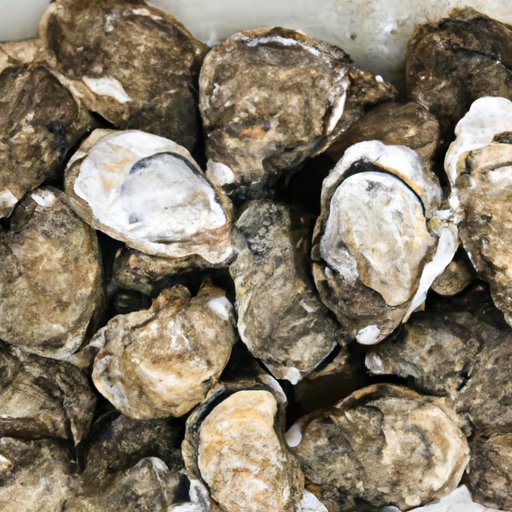Introduction
Oysters have been a part of human diets for centuries, with some cultures even venerating them as a sacred food. They are a type of mollusk found in coastal waters around the world, and can be eaten raw or cooked. But are oysters bad for you? This article will explore the nutritional value of oysters, their potential health benefits, and any risks associated with eating them.

Examining the Nutritional Value of Oysters
Oysters are a nutrient-dense food, providing a range of vitamins and minerals in each serving. They are particularly high in zinc, iron, and vitamin B12. A 3-ounce serving of raw oysters provides approximately 23% of the daily recommended intake of zinc, 10% of the daily recommended intake of iron, and over 200% of the daily recommended intake of vitamin B12.
In terms of calories, a 3-ounce serving of oysters contains only 66 calories. This makes them an ideal food for those following a low-calorie diet. Additionally, oysters are a good source of protein, providing 7 grams per 3-ounce serving.
Exploring the Potential Health Benefits of Eating Oysters
Eating oysters may provide a range of potential health benefits. One of the most widely studied is the impact of oysters on heart health. Studies have shown that eating oysters may help reduce blood pressure, lower LDL (“bad”) cholesterol, and improve HDL (“good”) cholesterol levels.
Oysters may also offer benefits for weight loss. Research shows that they contain compounds that can help reduce appetite and increase feelings of fullness. This could make them a useful addition to any weight loss plan.
Finally, studies suggest that oysters may have a positive effect on cognitive function, especially in older individuals. This could be due to their high levels of zinc, which is important for healthy brain function.

Investigating the Risks of Eating Too Many Oysters
Though oysters can be part of a healthy diet, there are some risks associated with eating them. The most common risk is contamination from bacteria or parasites. These can cause gastrointestinal issues such as nausea, vomiting, and diarrhea. To minimize this risk, it’s important to buy oysters from a reputable source and cook them thoroughly.
Another potential risk is over-consumption of sodium and cholesterol. Though oysters are relatively low in both, they can add up quickly if eaten in large quantities. As such, it’s important to monitor your intake of these nutrients when eating oysters.
Understanding the Role of Oysters in a Balanced Diet
Oysters can be a healthy addition to any diet, but it’s important to consume them in moderation. The American Heart Association recommends that adults should eat up to 3.5 ounces of seafood (including oysters) per week. This equates to roughly two servings per week. It’s also important to vary your seafood intake, as different types of seafood provide different nutrients.
When it comes to serving size, the general recommendation is to eat four to six medium-sized oysters per person. This serving size will provide a good balance of nutrients without overloading on calories or sodium.

Looking at the Effects of Different Preparation Methods on Oyster Nutrition
The way oysters are prepared can affect their nutritional value. Raw oysters tend to retain more of their vitamins and minerals than cooked ones, so they’re often viewed as the healthier option. However, cooking oysters can help reduce the risk of contamination from bacteria or parasites.
Other preparation methods, such as steaming or grilling, can also affect the nutritional value of oysters. For example, grilling can reduce the calorie content of oysters while adding a smoky flavor. Steaming, on the other hand, may help retain more of the vitamins and minerals.

Comparing Oyster Nutrition to Other Seafoods
When comparing oysters to other types of seafood, it’s important to consider nutrient density as well as calorie content. Generally speaking, oysters are a nutritious choice, providing a range of vitamins and minerals in each serving. They are also relatively low in calories, making them a good choice for those watching their weight.
When compared to other shellfish, oysters are generally considered to be a healthier option. For example, a 3-ounce serving of shrimp contains 84 calories and 1.5 grams of fat, whereas oysters contain only 66 calories and 0.4 grams of fat.
Analyzing the Impact of Oysters on Cholesterol Levels
It’s important to note that dietary cholesterol does not necessarily equate to increased blood cholesterol levels. In fact, research has shown that eating oysters may actually help reduce LDL (“bad”) cholesterol levels and increase HDL (“good”) cholesterol levels. This suggests that oysters may be beneficial for those looking to manage their cholesterol levels.
Conclusion
In conclusion, oysters can be a healthy addition to any diet. They are a nutrient-dense food, providing a range of vitamins and minerals, as well as being low in calories and a good source of protein. Eating oysters may also provide potential health benefits, such as improved heart health, weight loss, and cognitive function.
However, it’s important to be aware of the potential risks associated with eating oysters. Contamination from bacteria or parasites is possible, and over-consumption of sodium and cholesterol should be avoided. When eaten in moderation and cooked properly, oysters can be a nutritious and enjoyable part of a balanced diet.
(Note: Is this article not meeting your expectations? Do you have knowledge or insights to share? Unlock new opportunities and expand your reach by joining our authors team. Click Registration to join us and share your expertise with our readers.)
